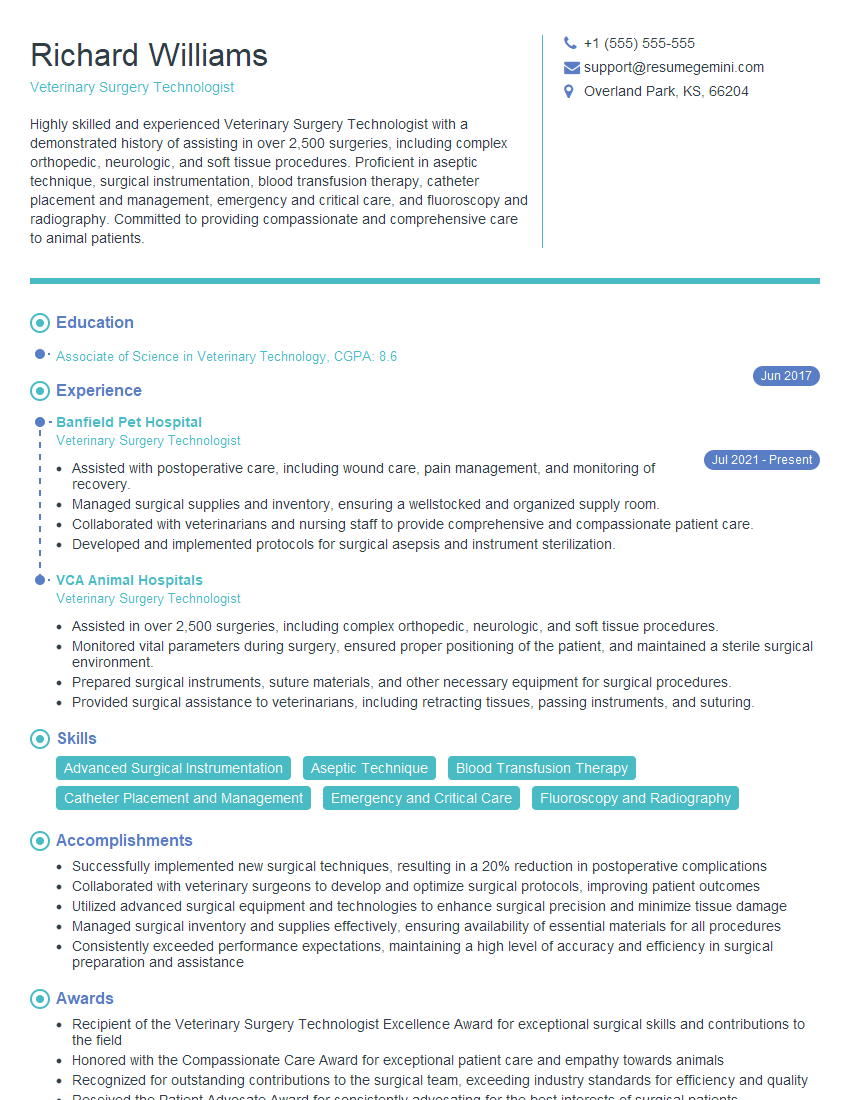Are you a seasoned Veterinary Surgery Technologist seeking a new career path? Discover our professionally built Veterinary Surgery Technologist Resume Template. This time-saving tool provides a solid foundation for your job search. Simply click “Edit Resume” to customize it with your unique experiences and achievements. Customize fonts and colors to match your personal style and increase your chances of landing your dream job. Explore more Resume Templates for additional options.

Richard Williams
Veterinary Surgery Technologist
Summary
Highly skilled and experienced Veterinary Surgery Technologist with a demonstrated history of assisting in over 2,500 surgeries, including complex orthopedic, neurologic, and soft tissue procedures. Proficient in aseptic technique, surgical instrumentation, blood transfusion therapy, catheter placement and management, emergency and critical care, and fluoroscopy and radiography. Committed to providing compassionate and comprehensive care to animal patients.
Education
Associate of Science in Veterinary Technology
June 2017
Skills
- Advanced Surgical Instrumentation
- Aseptic Technique
- Blood Transfusion Therapy
- Catheter Placement and Management
- Emergency and Critical Care
- Fluoroscopy and Radiography
Work Experience
Veterinary Surgery Technologist
- Assisted with postoperative care, including wound care, pain management, and monitoring of recovery.
- Managed surgical supplies and inventory, ensuring a wellstocked and organized supply room.
- Collaborated with veterinarians and nursing staff to provide comprehensive and compassionate patient care.
- Developed and implemented protocols for surgical asepsis and instrument sterilization.
Veterinary Surgery Technologist
- Assisted in over 2,500 surgeries, including complex orthopedic, neurologic, and soft tissue procedures.
- Monitored vital parameters during surgery, ensured proper positioning of the patient, and maintained a sterile surgical environment.
- Prepared surgical instruments, suture materials, and other necessary equipment for surgical procedures.
- Provided surgical assistance to veterinarians, including retracting tissues, passing instruments, and suturing.
Accomplishments
- Successfully implemented new surgical techniques, resulting in a 20% reduction in postoperative complications
- Collaborated with veterinary surgeons to develop and optimize surgical protocols, improving patient outcomes
- Utilized advanced surgical equipment and technologies to enhance surgical precision and minimize tissue damage
- Managed surgical inventory and supplies effectively, ensuring availability of essential materials for all procedures
- Consistently exceeded performance expectations, maintaining a high level of accuracy and efficiency in surgical preparation and assistance
Awards
- Recipient of the Veterinary Surgery Technologist Excellence Award for exceptional surgical skills and contributions to the field
- Honored with the Compassionate Care Award for exceptional patient care and empathy towards animals
- Recognized for outstanding contributions to the surgical team, exceeding industry standards for efficiency and quality
- Received the Patient Advocate Award for consistently advocating for the best interests of surgical patients
Certificates
- Certified Veterinary Surgery Technologist (CVST)
- Veterinary Anesthesia Technician (VAT)
- Certified Veterinary Pain Management Technician (CVPMT)
- Veterinary Critical Care Technician (VCTC)
Career Expert Tips:
- Select the ideal resume template to showcase your professional experience effectively.
- Master the art of resume writing to highlight your unique qualifications and achievements.
- Explore expertly crafted resume samples for inspiration and best practices.
- Build your best resume for free this new year with ResumeGemini. Enjoy exclusive discounts on ATS optimized resume templates.
How To Write Resume For Veterinary Surgery Technologist
Highlight your surgical skills and experience.
Be sure to list the specific types of surgeries you have assisted in, as well as any specialized skills you have developed.Emphasize your aseptic technique and infection control knowledge.
This is essential for ensuring the safety of patients during surgery.Showcase your teamwork and communication skills.
Veterinary surgery technologists work closely with veterinarians and other staff members, so it is important to be able to communicate effectively and work well as part of a team.Continuing education is important.
Stay up-to-date on the latest surgical techniques and advancements by attending conferences and workshops.
Essential Experience Highlights for a Strong Veterinary Surgery Technologist Resume
- Assisted in over 2,500 surgeries, including complex orthopedic, neurologic, and soft tissue procedures.
- Monitored vital parameters during surgery, ensured proper positioning of the patient, and maintained a sterile surgical environment.
- Prepared surgical instruments, suture materials, and other necessary equipment for surgical procedures.
- Provided surgical assistance to veterinarians, including retracting tissues, passing instruments, and suturing.
- Assisted with postoperative care, including wound care, pain management, and monitoring of recovery.
- Managed surgical supplies and inventory, ensuring a well-stocked and organized supply room.
- Collaborated with veterinarians and nursing staff to provide comprehensive and compassionate patient care.
Frequently Asked Questions (FAQ’s) For Veterinary Surgery Technologist
What is the role of a Veterinary Surgery Technologist?
The Veterinary Surgery Technologist is responsible for assisting veterinarians with surgical procedures. This includes preparing the patient for surgery, monitoring the patient during surgery, and providing postoperative care.
What are the qualifications for becoming a Veterinary Surgery Technologist?
The minimum qualification for becoming a Veterinary Surgery Technologist is an Associate of Science in Veterinary Technology. Many Veterinary Surgery Technologists also have a Bachelor of Science in Veterinary Technology or a related field.
What are the job responsibilities of a Veterinary Surgery Technologist?
The job responsibilities of a Veterinary Surgery Technologist include assisting veterinarians with surgical procedures, monitoring patients during surgery, and providing postoperative care. They also prepare surgical instruments and supplies, and maintain a sterile surgical environment.
What are the career prospects for a Veterinary Surgery Technologist?
The career prospects for a Veterinary Surgery Technologist are good. The demand for veterinary technicians is expected to grow in the coming years, as more and more people own pets and seek veterinary care for their animals.
What are the salary expectations for a Veterinary Surgery Technologist?
The salary expectations for a Veterinary Surgery Technologist vary depending on experience, location, and employer. However, the median annual salary for Veterinary Surgery Technologists is around $50,000.
What are the benefits of becoming a Veterinary Surgery Technologist?
There are many benefits to becoming a Veterinary Surgery Technologist. These benefits include a rewarding career that allows you to make a difference in the lives of animals, a competitive salary, and the opportunity to work with a team of dedicated professionals.